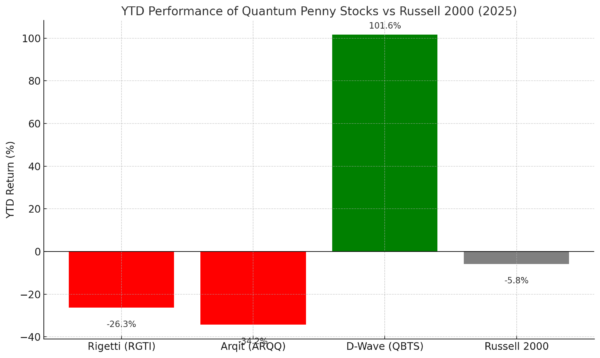Dell Stock: An AI Turnaround Story?
The artificial intelligence rally has been in full swing for a few months. Companies like SMCI (Nasdaq: SMCI) and Nvidia (Nasdaq: NVDA) have generated jaw-dropping returns. Impressive returns for these AI stocks has caused investors to go on the hunt for other companies that might benefit from the rise of AI. This hunt has led many investors to Dell stock (Nyse: DELL).
Despite being one of the OG computing companies, Dell has bounced in and out of the public markets and gone through a massive transformation over the past decade or so. The company was taken private in 2013 via a leveraged buyout but returned to the public market again in 2018. I’ve taken a deep dive into Dell’s revamped business to see if it could benefit from the AI rally. Here’s what you need to know.
Dell Stock: Last Three Quarters
To get an idea of whether Dell stock is a buy, the first most common first step is to examine its most recent earnings reports. This lets you know if the company is growing each quarter. If a company’s revenue is growing consistently then its stock price almost always follows. Here are Dell’s last few quarters:
- February 2024
-
-
- Revenue: $22.32 billion (-11% annually)
- Net Income: $1.16 billion (+88% annually)
-
- November 2023
-
-
- Revenue: $22.25 billion (-10% annually)
- Net Income: $1.01 billion (+310% annually)
-
- August 2023
-
- Revenue: $22.93 billion (-13% annually)
- Net Income: $462 million (-10% annually)
Right away, you can see the turnaround in Dell’s net income starting two quarters ago. It posted a whopping 310% increase in net income two quarters ago, followed by an 88% surge in net income last quarter. However, revenue has been falling modestly over the past three quarters.
Read More: How to Identify Turnaround Companies?
Dell’s Most Recent Earnings Call
To get more details on the company’s performance, I read through Dell’s most recent earnings call. Here’s what you should know:
- Rising server & network revenue: Dell’s Infrastructure Solutions Group (which consists of servers, networking, and storage) posted $9.3 billion in revenue, up 10% sequentially. AI-optimized servers drove most of this growth.
- Increasing its dividend: Dell raised its dividend by 20% last quarter, a common sign that the business is doing well. Management would not raise the dividend unless they had confidence that the business was generating consistent cash flow.
- Key quote: “Our strong AI-optimized server momentum continues, with orders increasing nearly 40% sequentially and backlog nearly doubling, exiting our fiscal year at $2.9 billion,” said Jeff Clarke, vice chairman and chief operating officer, Dell Technologies.
Interestingly, Dell’s business seems to be firing on all cylinders – despite the fairly stagnant revenue. I think the bigger story here is Dell’s mission to reposition itself.
Dell Stock: Should You Invest?
As the largest server manufacturer in the world, investors have long viewed Dell as a dinosaur in the computing industry. In general, this is a bad sign for a company. Investors have looked at Dell as a company whose high growth days are behind it (myself included, admittedly). This stigma changes the way that investors value a company.
If investors do not anticipate growth then they will value the company humbly, and its stock will stay fairly flat each year. But, if investors sense growth is ahead then they will buy up shares in anticipation of future growth. This is what causes some companies to achieve massive valuations while others don’t. For a perfect example of this, check out Tesla (Nasdaq: TSLA), which is worth more than the next 10 automakers combined.
Dell’s Turnaround Story
Despite being a dinosaur, investor’s perception of Dell’s might be starting to change. Over the past few years, Dell has implemented serious overhauls to its business:
- 2013: Founder Michael Dell took the company private to focus on the innovations and long-term investments with the most customer value.
- 2015: Dell reported a record high for customer satisfaction rates.
- 2016: Dell and EMC completed one of the largest mergers in tech history.
- 2018: Dell went public again with a reinvigorated vision. Its stock is up 775% since going public again.
- 2021: Dell spun off VMWare to focus on its core competencies.
Notably, Dell has revamped its focus on returning value to shareholders. The company has returned 90% of its adjusted free cash flow to shareholders over the past 8 quarters through dividends and stock buybacks.
On top of that, almost all of Dell’s industries are positioned for growth:
- Experts expect global data collection to grow at a 25% CAGR by 2027
- Experts expect the AI total addressable market to grow at a 18% CAGR over the next 4 years
- According to its investors presentation, Dell expects its targeted markets to grow from $1.2 trillion in 2019 to $2.1 trillion in 2027 – an increase of $900 billion.
So, Dell has done a good job of repainting its own story. Instead of being a dinosaur, investors now view it as the largest server manufacturer in the world that’s taking advantage of two megatrends: AI-driven workloads and hybrid work. Dell expects both of these trends to lead to future growth and profitability. On top of that, Dell is prioritizing shareholder value more than ever via stock buybacks and dividends.
Dell is still only aiming for annual revenue growth of 3-4%, according to its investor presentation. So, my expectations for Dell stock are not too lofty. Especially compared to another high-potential AI stock that I wrote about recently. But, at the same time, the company seems to have done a great job repositioning itself and changing its identity with investors. I certainly wouldn’t bet against Dell stock while the AI hype is still ongoing.
I hope that you’ve found this article valuable when it comes to learning about Dell stock. If you’re interested in reading more, please subscribe below to get alerted of new articles.
Disclaimer: This article is for general informational and educational purposes only. It should not be construed as financial advice as the author, Ted Stavetski, is not a financial advisor. Ted also does not own shares of Dell.
About Teddy Stavetski
Ted Stavetski is the owner of Do Not Save Money, a financial blog that encourages readers to invest money instead of saving it. He has five years of experience as a business writer and has written for companies like SoFi, StockGPT, Benzinga, and more.





